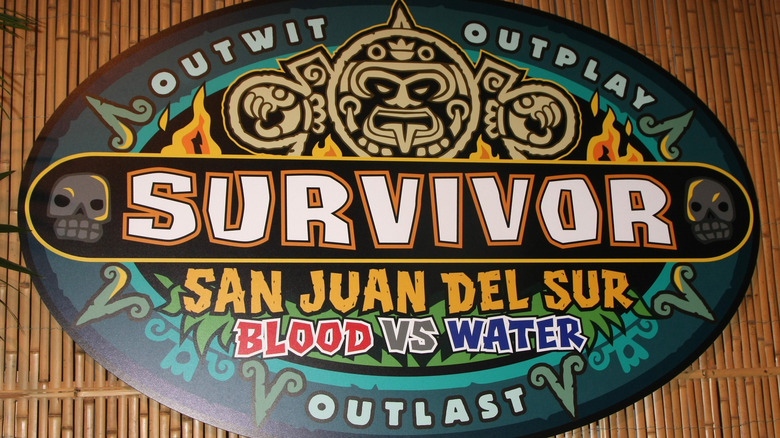This Is How Much We Think 'Survivor' Contestants Make From The Show
The whole point of the juggernaut American reality TV game show "Survivor," on the air now for over 40 seasons, is to outwit, outlast, and outplay the competition to win the $1 million grand prize (via Parade). One might imagine that contestants would otherwise balance exposure from the show with any possible payoff from winning, such as lucrative brand endorsements or some other kind of valuable career boost in acting, modeling, or in music. But are "Survivor" contestants paid for their time on the show even if they end up not winning it all?
There's similar secrecy surrounding how much money runners-up and even the first person voted off pocket for their time on the series. What we do know comes mostly from former contestants themselves.
What's for certain is that there is definitely a cash incentive for each player regardless of when they leave the show, and that dollar amount varies somewhat not only from season to season, but also across the 25 different countries that have some version of "Survivor" on TV.
Does the first person voted off 'Survivor' still get a paycheck?
As anyone who has ever watched "Survivor" is well aware, each episode of the series concludes with "tribal council," in which cast members gather to vote off one of their own (via Britannica). This is also the time when alliances and other forms of strategic maneuvering between players are often exposed. To be the first one voted off "Survivor" carries its own kind of shame — all that time off work and suffering the elements with nothing to show for it.
Although the first to go home in any "Survivor" season won't take home $1 million (or $2 million in season 42, according to Entertainment Weekly), those first players to leave are still financially compensated for their participation. According to Life & Style Magazine, the first contestant to have their torch snuffed by "Survivor" host Jeff Probst typically makes $2,500 for their efforts. But that's barely enough to cover more than a few months of rent in New York or San Francisco. Let's hope those brand endorsement come quickly.
What about second and third place?
As the game of "Survivor" progresses, the number of players diminishes, upping the stakes until just three contestants are left. The twist is that the winner is chosen by a jury of their former castaways. How to vote someone off without making them so angry that they won't vote for you in the end is part of the game's grand strategy. The last one remaining gets the money and the title of "Sole Survivor" (via Britannica). But what about those runners-up?
What the second and third place finishers earn from their time on "Survivor" varies a bit. Typically they make anywhere from $80,000 to $100,000, with first season third-place finisher Rudy Boesch (pictured above) pocketing $85,000 and fourth-place finalist Sue Hawk pulling down a cool $70,000 that same season, as Life & Style Magazine magazine reports. Fortune says the runners-up tab has grown, reaching as much as $110,000 in recent seasons. One player sent home mid season still scored $27,000 for her effort.
Do players get paid for appearing in the finale?
The title of "Sole Survivor" is typically awarded in a big series finale, in which each former castaway returns to recap the season in a reunion-style event (per Britannica). Those finales are filmed some months after everyone has returned home from whatever far flung location at which the series was filmed. The truth is, those players haven't come back for additional filming just out of the kindness of their hearts. Each one is paid to appear in the finale.
The dollar amount each "Survivor" contestant takes home for their final return is usually around $10,000, according to Entertainment Weekly. The popular series upped the ante a bit in 2020 for the 40th season, with an across-the board-payout of $25,000 to each player for participating (all players were former winners of the show's previous seasons), on top of the $10,000 offered to return for the finale. Those sitting in on the jury also get paid a bit more, to the tune of $40,000. Not too bad (via Fortune).
What do 'Survivor' contestants in other countries make?
"Survivor" is an international phenomenon, with versions of the show on the air all over the world. Naturally, the cash prizes offered differ widely from the U.S. version. One such example is "Australian Survivor," in which contestants make far less than their American counterparts, as Now to Love has covered.
Turns out, "Australian Survivor" castaways make only $AU 90 a day, with a total grand prize of AU$ 500,000 for winning. That's only about $70 USD to play the game per day, or a $375,000 grand total to win it all (via The Money Converter). Clearly it pays to be an American "Survivor" contestant, where typically speaking you can feel pretty assured to clear at least $12,000 if you get reasonably far in the competition (via CinemaBlend.)
Mo' Money Mo' Problems
But just because a player takes home the (at least) $1 million jackpot, not to mention profiting from the exposure, it doesn't mean the rest of their life is a fairytale. For example, Richard Hatch (pictured above), the show's first-ever "Sole Survivor" got himself in plenty of tax problems after his win (via E! News). From there, one season contestant was slapped with a $5 million penalty for leaking a picture of himself before the official cast had been announced (per TMZ). Fail to show up to the finale or breach your contract in any other way, and you may earn nothing at all.
Regardless of how much money they make, "Survivor" really is a difficult show to appear on, according to Life & Style Magazine, and the vast majority of the former contestants — even though some return for follow-up seasons for an additional payday — return to their normal lives after production concludes, making their money the old fashioned way: with a job (per E! News).





